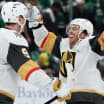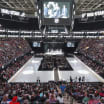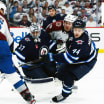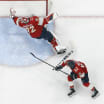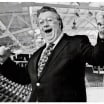Legendary hockey reporter Stan Fischler writes a weekly scrapbook for NHL.com. Fischler, known as "The Hockey Maven," shares his humor and insight with readers each Wednesday.
This week Fischler's "Strange but True" feature focuses on an unheralded forward who went on to win the Hart Trophy as a defenseman despite playing for one of the worst teams in NHL history.
Tommy Anderson won Hart Trophy in only season as NHL defenseman
Was League MVP after switching from forward with Brooklyn Americans in 1941-42
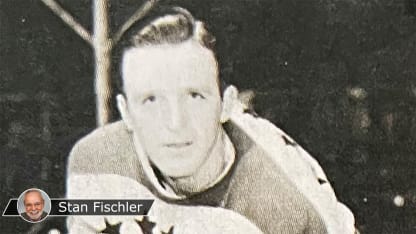
By
Stan Fischler
Special to NHL.com
Everything was unusual about defenseman
Tommy "Cowboy" Anderson
and his team during the 1941-42 season.
For starters, Anderson's team, the Brooklyn Americans, never played a game in Brooklyn. They shared Madison Square Garden in Manhattan with their rival New York Rangers. The only Brooklyn thing about the Americans was where they practiced, at a tiny rink across the East River -- the Brooklyn Ice Palace.
As for Anderson, he had been a forward his entire NHL career, first as a left wing with the Detroit Red Wings in 1934-35 and then for five seasons with the New York Americans, before they adopted the Brooklyn label. Yet, Anderson won the Hart Trophy voted as NHL most valuable player in 1941-42 playing a new position; and had the dubious honor of becoming the first player from a non-playoff team to be named the MVP of the League.
"We saw plenty of 'Andy' at The Garden," Rangers coach Frank Boucher said. "He had all the offensive tools -- an accurate shot and the ability to make the good pass. He wasn't the best skater but managed to learn defense overnight. You could say he carried the Americans."
As good as he was, Anderson couldn't lift the beleaguered "Amerks," as they were also known, out of the cellar in the seven-team NHL. Brooklyn finished the 48-game season last with 16 wins while the Rangers secured first place with 29 victories.
But Anderson scored an NHL career-high 41 points (12 goals, 29 assists) in 48 games, most among NHL defensemen and tied for eighth among all skaters.
Interestingly, when The Hockey News published its Top 100 Defensemen of All-Time, THN editor in chief Jason Kay deleted Anderson from consideration despite -- at the time -- that he was only one of seven defensemen to have won the Hart Trophy.
"It shouldn't surprise that Anderson did not crack our top-100 list," Kay said. "We didn't feel the one-and-done year -- no matter its brilliance -- was enough."
Red Dutton, the Americans manager and coach, was the one who had the idea in the fall of 1941 to move Anderson from forward to defenseman, though he never thought the experiment would be so productive.
"In a way," Dutton explained, "Cowboy's switch was a matter of necessity since our roster already had been trimmed because of war enlistments. I was short on the blue line, so I figured I'd give him a try back there.
"I could afford the gamble because we had some good, young forwards -- Harry Watson, Ken Mosdell, plus a vet like Mel Hill. Still, I never would have guessed Tommy would wind up a First All-Star playing his new position."
Many critics believed that more prominent stars like Syl Apps, captain of the Stanley Cup champion Toronto Maple Leafs, deserved the Hart that season. Other worthy candidates included Bill Cowley of the Boston Bruins, Lynn Patrick of the Rangers and Elmer Lach of the Montreal Canadiens.
So, how did Anderson beat out the big-time stars?
Some voters claimed it was because Anderson "stood out on that sad-sack Americans club." In winning the Hart Trophy, Anderson collected nearly twice as many votes as the runner-up, Apps.
Although Anderson was born in Edinburgh, Scotland, his family emigrated to Canada's west when he was a young boy. He earned the nickname "Cowboy" while starring for his hometown team, the senior Drumheller, Alberta Miners.
He then played three seasons in the Canadian-American Hockey League with the Philadelphia Arrows before turning pro in Detroit with the Red Wings during the 1934-35 season.
After being sold to the Americans, Anderson continued to improve and enjoyed his best season as a forward in 1938-39, when he scored 40 points (13 goals, 27 assists) in 47 games.
"It's hard to say how much better Andy would have been had we kept playing another season," said Dutton who was forced to disband the Americans later in 1942 because of a player shortage caused by World War II.
The remaining Americans players were distributed among the Original Six teams in a dispersal draft and the Maple Leafs claimed Anderson. He showed up at training camp in the fall of 1942, but then decided to enlist in the Canadian (Infantry) Army and never played in the NHL again.
"He became the only player to end his big-league career as the defending Hart Trophy-winner," Kay wrote.
At war's end, he was deemed too old for the youth-oriented Maple Leafs so Anderson played one season with Providence of the American Hockey League in 1945-46 and concluded his playing career with Toronto's farm team, the Hollywood Wolves, where he became player-coach. One of Anderson's assignments was to tutor young defenseman Bill Barilko.
"Billy was green," Anderson remembered, "but he was willing and he learned fast."
Barilko soon was promoted to the Maple Leafs and helped them win the Stanley Cup four times. He scored the overtime winner in the 1951 Cup Final.
But like Anderson's other feats -- the grooming of Barilko and the ending of his playing career on a high note with the lowly Americans -- Anderson goes down in history as a forgotten MVP.
Or, as Kay so aptly put it, "Cowboy Anderson is the most anonymous Hart Trophy winner in NHL history!"


